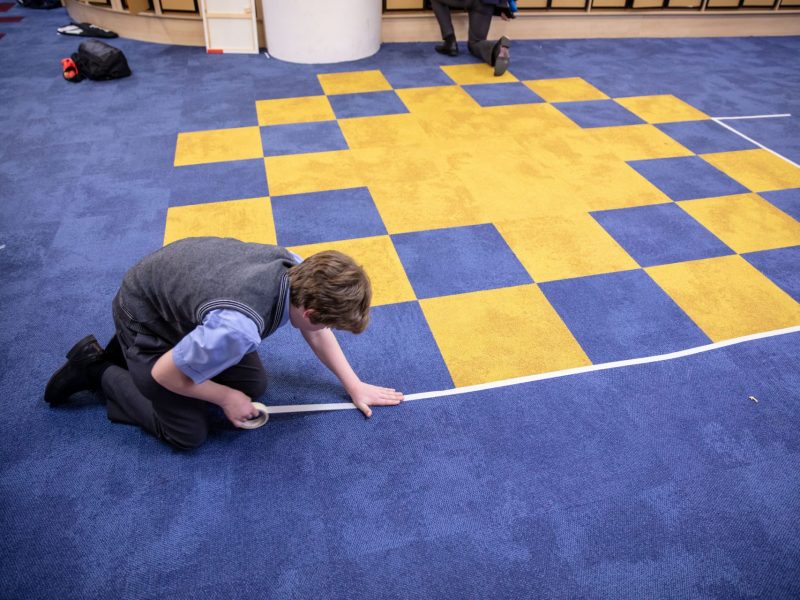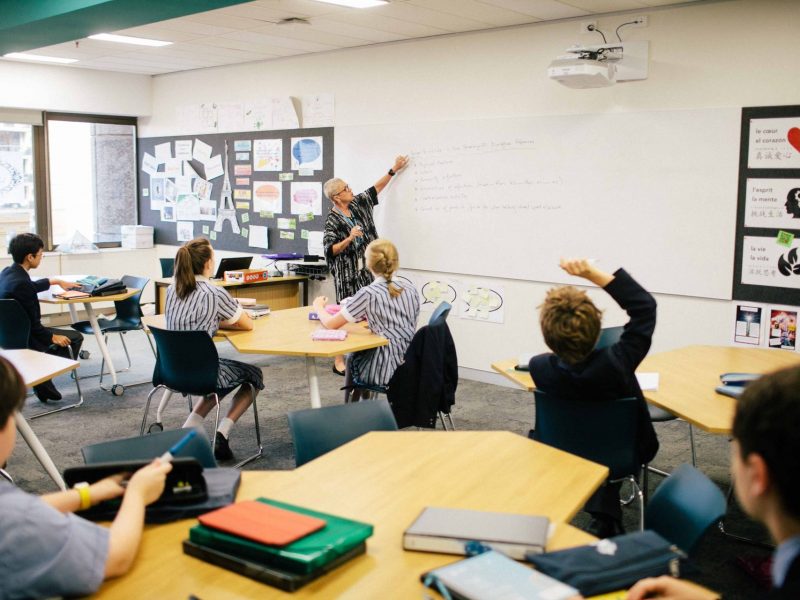We teach the NSW curriculum through the MYP framework.
We are interested in how students learn – using communication, research, self-management, collaboration and critical thinking skills.

All students commencing Year 7 undertake the Middle Years Programme (MYP) of the International Baccalaureate under the curriculum of NESA, an internationally recognised framework for learning, specifically designed for students aged 11 to 16, representing best practice in Junior Secondary schools. Students continue to follow the content of NSW syllabuses, while the MYP provides the framework for learning.

The IB MYP is specifically designed for students aged 11 to 16 and caters to their particular learning needs and styles during this stage of life. It does not provide content but rather the manner in which the subjects are taught and assessed.
The MYP puts an emphasis on learning by doing and experiencing. For instance, a science lesson on materials might see the students making shoes in order to make real-world connections with key concepts. It is inclusive in nature, providing academic rigour for all students, including gifted and talented and those needing support.
As the culmination of the student’s final year of the MYP, they undertake an independent ‘Personal Project’, which is a significant piece of work of the student’s own initiative and creativity. The project requires research and the creation of a product with supporting documentation. Examples of this have been the creation of a garden, a website detailing ways to save power or the writing of a novel. This incredibly rewarding project gives students an opportunity to research an area of passion which may not have been covered in school subjects.
The MYP ensures that the middle years of schooling are not lost. Rather it builds skills so that our students are prepared for the move to the senior years, regardless of whether they chose to study the HSC or the IB Diploma. For instance, the independent ‘Personal Project’ readies a student for the challenges of a major work.
Is the MYP more academically rigorous and perhaps too challenging for some students?
The introduction of the MYP at other Australian schools has seen a distinct improvement in the HSC and IB Diploma results of students in those schools two years later, when they graduated from Year 12. Students entering Year 11, whether they chose the HSC or International Baccalaureate Diploma, were better equipped to function with senior school academic rigour, than had been their predecessors. It is an inclusive programme designed to suit every learner, where best practice is required.
The advantages of the MYP
We want to encourage our students to become more skillful in their thinking. The MYP calls this ‘Approaches to learning’ (ATL). These are skills designed to enable students “learn how to learn.” For instance, in the classroom, this means the teacher makes thinking more explicit or more transparent to the learner, as an example, by outlining a plan for more skilful thinking through a set of questions. This means we have a common language for teachers and students to use when reflecting and building on the process of learning.
In a world that is increasingly connected, but also (paradoxically) increasingly divided along party lines, we teach our students to be outward-looking, hopeful and respectful citizens, not afraid of difference but aware of their communal obligations, connected to the global community with a sense of responsibility towards its members.
The aim of the MYP is to develop students who are internationally minded: responsible members of local, national and global communities. International-mindedness is a view of the world in which people see themselves connected to the global community and assume a sense of responsibility towards its members.
Our curriculum, therefore, promotes awareness of individual, local, national and world issues, with opportunity for reflection on commonality, diversity, and multiple perspectives.
A focus on character helps our students to become competent communicators, open-minded and knowledgeable.
We make meaningful interdisciplinary connections rather than teaching subjects in isolation. This helps students to see the connections between subjects and the real world. After all, most real-world issues require insights gained from a variety of disciplines, thus our students learn to draw on the many different approaches to acquiring knowledge.
The MYP looks at the development of the whole person with service central to its philosophy which marries well with our Christian ethos. The development of character (IB Learner Profile/SACS Character Strengths) is vital to this is embedded in every part of our academic and pastoral programmes. For more on character, see Wellbeing and Character
As part of the MYP framework, all students are required to take part in service activities both within the classroom and beyond. This may take the form of awareness-raising of global problems in Geography or creating quilts in Textiles to give to orphans in countries like Uganda. Our approach to service is driven by a Christian worldview that prioritizes meaningful, authentic service that meets the needs of others. For more on service, see Service Learning.
In the final year of the MYP, students undertake an independent ‘Personal Project’ which is a significant piece of work of the student’s own initiative and creativity. The project requires research and the creation of a product with supporting documentation. Examples of this have been the creation of a garden, a website regarding ways to save power or the writing of a novel. This incredibly rewarding project gives students an opportunity to research an area of passion that may not have been covered in school subjects.
MYP assessment and reporting
MYP assessment is different to more traditional ideas of assessment in that it is a criterion-based assessment. Credit is given to what they know and can do. Each subject has four criteria each out of 8. Year 7 and 8 use the same criteria, so learning is seen as a continuum, with results expected to be higher in Year 8 than Year 7. Assessment tasks may contain two, three or four of these criteria. An Assessment Notification is uploaded onto the School’s learning management systems, Edumate and Schoology two weeks prior to the due date with the assessment criteria on it. Marks should not be seen in total for an assessment but what they achieve in each criterion. At the end of each semester, students will receive a report for each subject with the four MYP criteria and NESA outcomes. They also receive an overall MYP Grade out of 7, in line with the IB Diploma Programme, and a NESA Grade. On the report will be a Grade distribution graph to allow students and parents to see where they are sitting in their cohort, and a teacher comment.
Students receive interim reports, issued towards the end of Terms 1 and 3. They provide a general overview of how students are performing. They cover aspects such as participation, organisational skills, group work, independent learning, presentation of work, and behaviour.
School reports are issued at the end of Terms 2 and 4. They provide a comprehensive summary of student progress for Semester 1 and Semester 2 respectively.
Parent/teacher interviews occur annually for Middle School students, usually in Term 1 or 2.
We also have Progressive Reporting: Three weeks after an assessment, parents and students receive their results via the School’s parent portal, with teacher feedback on the assessment and specific guidance on how to improve.
A Weekly Parent Digest is also emailed to students and their parents every Friday afternoon. This gives a brief summary of student progress, awards and events. As well as this, there are informal opportunities for parents to discuss their child’s progress through conversations with individual class teachers. The Parent Portal provides most of the information related to school activities.
We believe research and evidence-based practice is at the basis of excellent teaching and learning. The School uses data dashboards to analyse student results. These highlight where classes and students are doing well but also pinpoint areas for growth. Teachers, Specialised Learning and Gifted and Talented use the data dashboards to recognise students in need of extra support or extension.
You may be interested in
